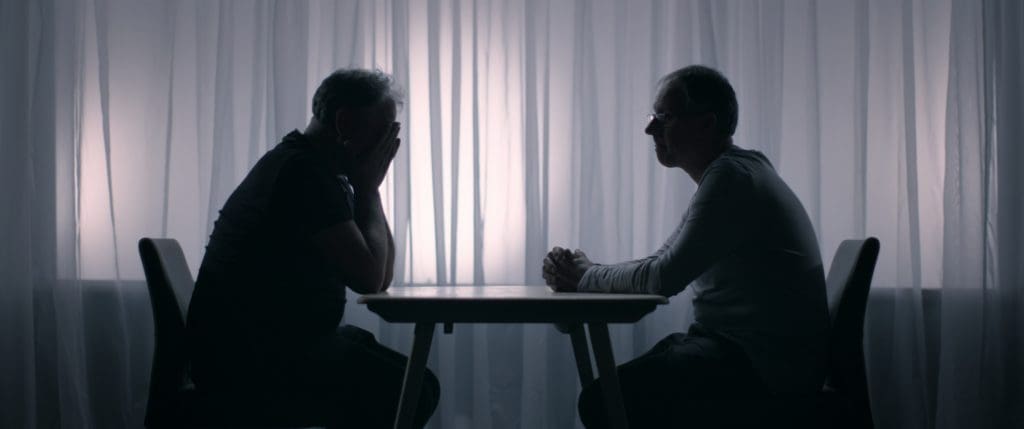
What if you forgot the worst thing that ever happened to you? How would it change you? Would you always know something was missing? That is, in large part, the idea posed by the new documentary, Tell Me Who I Am, which hits Netflix on Friday. It tells the story of twin brothers, Marcus and Alex Lewis, who also wrote a biography of the same name back in 2013.
In 1982, at the age of 18, Alex was in a motorcycle accident that left him with the “mental age of a 9-year-old” and no memory of anything about his life–even his own name–except for Marcus. With no reason to question anything Marcus told him, Alex slowly rebuilt his personality and understanding of their childhoods over the next decade, but after both of their parents died, Alex discovered that much of what Marcus told him about their upbringing were lies.
Fast forward to now and not only has it been three decades since Alex had that revelation, but Marcus still hasn’t told him the horrible truth of their childhoods. Director Ed Perkins spends the film’s bulk slowly revealing that shocking truth to both us and Alex. It’s a potentially salacious set up and one that could easily become exploitative. However, thanks to Perkins’s confident storytelling and sensitive, often evocative images, the film is not only a captivating slow-build mystery, but a cathartic examination of the way the Lewis brothers process their trauma together.
When it starts, Tell Me Who I Am plays much like the true-crime thrillers we’re used to seeing. Like, Alex–from whose perspective the film’s first act is largely told–the audience doesn’t know what parts of their childhood Marcus elided, or initially that he lied at all. Rather, Perkins leaves it to the viewer to guess that something sinister lies in their past. Some of that is implied in the interviews Alex and Marcus give. For instance, the strict rules that kept the brothers largely separate from their parents in their own home. Certainly, there’s something off about the fact that they lived in the garden shed instead of the main house for years, but it’s the shot we see of the boys curled in fetal positions in their respective beds at that young age that suggests the living situation is connected to the horrors they experienced. Similarly, it’s not just the fact that they weren’t allowed to eat with their parents or go upstairs in the house that’s concerning, it’s the low-lit shots of the empty dining table and the shot of a cluttered staircase through a doorway that suggests some terrible secret lurks upstairs.
That said, it’s not immediately apparent how clever Perkins’s filmmaking is. Because the film’s storytelling is driven entirely by what Alex and Marcus say in their interviews, the images we see can initially seem purely a method of making the film more visually interesting than just a series of talking heads. Indeed, while the film is both immersive and unnerving on a big screen, many viewers, who will watch it on computers or other devices with small screens, will likely engage with the film on a primarily aural level, like a well-edited podcast with images you can take or leave as part of the experience. However, in much the same way Alex accumulates knowledge after the accident, what Perkins presents visually only becomes more meaningful and upsetting as the audience gets more context about what happened to the brothers. An image of car headlights gliding over the ceiling of the brothers’ garden shed bedroom seems innocuous the first couple times, but it’s downright horrifying by the time we know the truth.
To that point, it’s hard to talk about what makes Tell Me Who I Am so impactful without divulging what happened to Marcus and Alex, but based on the fact Marcus tells their father he doesn’t forgive him in his final days and that he didn’t cry after his mother died, it’s easy to guess at least the nature of what happened. However, while the details of the trauma are the brothers’ and, on some level, the film’s ultimate goal, is to explore how knowing and not knowing the truth has profoundly affected both. In the film’s second section, told largely from Marcus’s perspective, he admits, “I look back on it now and it’s appalling, what I did.” However, he also explains that part of why he kept the lie going was because it allowed him to process the trauma too. “Alex lost his memory by accident,” he says, “and I lost it voluntarily. And it was great.”
Given that, it’s easy to understand why Marcus has kept the secret for so long, but part of what makes Perkins’s film so impressive is that he’s equally sympathetic to both brothers’ feelings. As Alex explains after learning that he’d been lied to and a fraction of the truth, he became suicidal and even though his wife and family have helped him work through that trauma in the years since, his life still feels “imaginary” without that terrible knowledge. To their credit, both brothers seem to understand the other’s perspective and watching them talk through their emotions both before and after Marcus reveals the truth is at once heartbreaking in how much it hurts both of them and incredibly moving in how open and empathetic their relationship is.
Given the awfulness of that that revelation, watching the brothers’ raw emotions in that moment can feel like intruding. And if Tell Me Who I Am‘s sole goal were to reveal their family secret, perhaps there would be something crass and inappropriate about the film’s final minutes. Instead, because Perkins focuses on the way Alex and Marcus’s relationship both binds them and allows them to survive despite what they’ve experienced it, he allows the audience to experience that catharsis with them. It may not be the most pleasant experience, but it’s not one viewers will forget.

